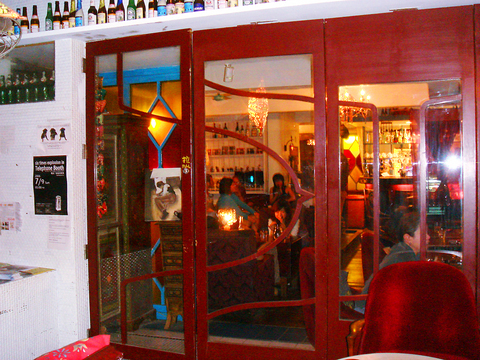Barbie and Angel are globe trotters whose travels to exotic locales are more like pilgrimages than sightseeing trips. Three years ago, the two Taipei girls visited Pushkar, India, and were inspired by the Hindu holy city's temples and shops.
"We saw a lot of foreigners in Pushkar, and we felt very comfortable in the shops there," Barbie told the Taipei Times. "We wanted to open up a restaurant with a similar feel in Taipei."
The result: The Peacock.

PHOTO: MAX HIRSCH, TAIPEI TIMES
The Shida night market bar and restaurant boasts a menu that is as eclectic as its decor. And behind the bistro's French doors, a dimly lit lounge that could pass for a set on That '70s Show enchants diners with its retro feel and twilight lighting.
Angel's touch -- besides her haunting paintings -- is the tasty Italian cuisine, which she learned to cook while running an Italian bistro before she opened the Peacock with Barbie. The two also traveled to Goa, India, to learn how to make Indian cuisine from a master chef. That pilgrimage resulted in their adding Tandoori lamb, as well as lamb and chicken masala dishes to the menu.
From vegetarian dishes, appetizers, entrees, to beers, wines, and cocktails, the Peacock has something for everybody. The pizzas are especially popular with diners, Barbie said. Smokers can taste a Hookah pipe -- a Middle Eastern "bong" with a long tube through which users inhale tobacco smoke. At the Peacock, smokers can sample a variety of flavored tobacco. Ever wonder what strawberry, peach, or cherry-flavored Hookah tobacco tastes like? Well, if you do, you don't have to go to Pakistan or Turkey to find out.
Whether on your food or in your lungs, the Peacock's exotic herbs make for a memorable outing. For diners more interested in conventional Western food, however, they won't be disappointed. Plenty of less adventurous dishes and beverages keep traditional tastebuds happy.
What may make diners a bit unhappy, though, is the quality of service, which is sometimes slack. You may have to fetch your own napkin or a water pitcher at peak hours, but a little patience will see you through. The bistro's laidback ambiance, complete with the hippest tunes around, keeps diners comfortable and engaged. Free wireless Internet service and a downstairs parlor for large groups are also plusses. A newly built enclosed front porch is open to customers who prefer to nurse a cocktail or eat a meal outside.

April 14 to April 20 In March 1947, Sising Katadrepan urged the government to drop the “high mountain people” (高山族) designation for Indigenous Taiwanese and refer to them as “Taiwan people” (台灣族). He considered the term derogatory, arguing that it made them sound like animals. The Taiwan Provincial Government agreed to stop using the term, stating that Indigenous Taiwanese suffered all sorts of discrimination and oppression under the Japanese and were forced to live in the mountains as outsiders to society. Now, under the new regime, they would be seen as equals, thus they should be henceforth

Last week, the the National Immigration Agency (NIA) told the legislature that more than 10,000 naturalized Taiwanese citizens from the People’s Republic of China (PRC) risked having their citizenship revoked if they failed to provide proof that they had renounced their Chinese household registration within the next three months. Renunciation is required under the Act Governing Relations Between the People of the Taiwan Area and the Mainland Area (臺灣地區與大陸地區人民關係條例), as amended in 2004, though it was only a legal requirement after 2000. Prior to that, it had been only an administrative requirement since the Nationality Act (國籍法) was established in

Three big changes have transformed the landscape of Taiwan’s local patronage factions: Increasing Democratic Progressive Party (DPP) involvement, rising new factions and the Chinese Nationalist Party’s (KMT) significantly weakened control. GREEN FACTIONS It is said that “south of the Zhuoshui River (濁水溪), there is no blue-green divide,” meaning that from Yunlin County south there is no difference between KMT and DPP politicians. This is not always true, but there is more than a grain of truth to it. Traditionally, DPP factions are viewed as national entities, with their primary function to secure plum positions in the party and government. This is not unusual

US President Donald Trump’s bid to take back control of the Panama Canal has put his counterpart Jose Raul Mulino in a difficult position and revived fears in the Central American country that US military bases will return. After Trump vowed to reclaim the interoceanic waterway from Chinese influence, US Defense Secretary Pete Hegseth signed an agreement with the Mulino administration last week for the US to deploy troops in areas adjacent to the canal. For more than two decades, after handing over control of the strategically vital waterway to Panama in 1999 and dismantling the bases that protected it, Washington has